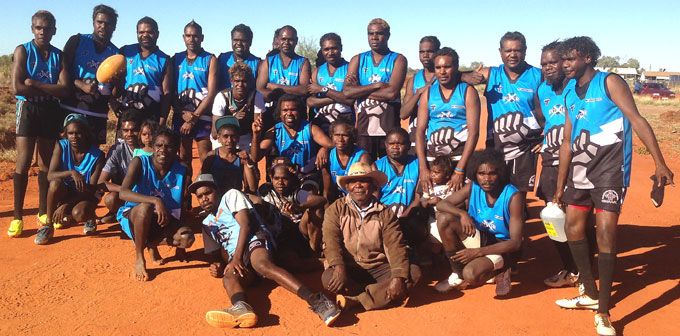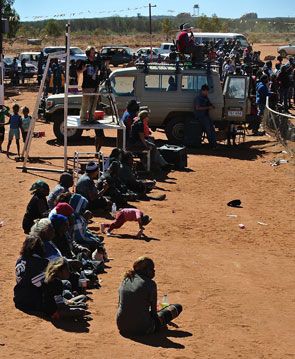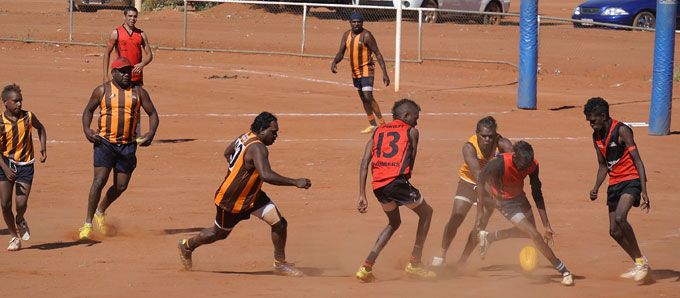Footy glory for Centre's best lasts just a weekend
3 August 2013

By ERWIN CHLANDA
Once a year a small remote town north-west of Alice Springs is the place to meet the top crop of young men in the nation’s desert centre.
But their glory is brief: when the Yuendumu Sports weekend is over they go back to the depressing idleness to which Australia consigns them, languishing on the dole or being under-employed.
After an emotional start yesterday the Sports got into full swing today with 16 teams, some from hundreds of kilometres away, taking to the red dirt footy field – not a trace of grass – for the Australian Rules carnival. They played a round of two 20-minute halves with the grand final on Monday or Tuesday.
The players’ determination, skill and strength delighted the crowd sitting in their cars or in the dust around the oval, watching the miracles these young men, some barefoot, performed: their legendary skills moving the ball low to the ground, at dazzling speeds, and sometimes taking the screaming marks which have elevated some to national league sides.
 What can they look forward to when they return home in their crowded mini buses on Monday or Tuesday? Not much.
What can they look forward to when they return home in their crowded mini buses on Monday or Tuesday? Not much.
We surveyed the current employment of the players from some teams, each with 25 to 35 players. We spoke to the team managers, coaches or captains. Some were not keen to reveal much and needed quite a bit of prompting – but the waste of talent is so overwhelming that it cannot be ignored.
The photo above shows the team from Cockatoo Creek 50 kms north-east of Yuendumu. According to captain Elijah Jones, only one player has a job – in aged care.
Captain of the team from Nyirripi, west of Yuendumu, Urich Wilson, says of the 25 players, nine to 12 young men work at the Mt Theo outstation, a facility to rehabilitate petrol sniffers. Three or four work at the store.
Manager of the Libanangu Hawks from Kintore, Randall Wilson, says his players are either on the dole or on CDEP, a work for the dole scheme under which people usually perform menial tasks part-time.
Of the Anmatjere Cowboys, north-east of Alice Springs, two are field officers for the shire, one works for the Sports and Recreation department and one in the store. The rest are “on some sort of CDEP training,” says Captain Alwyn Daniels.
Leo Watson, the captain of the Docker River Eagles, from the south-western corner of the Territory, says five of his team have jobs with the shire “picking up rubbish”, one works in the store and one as an assistant teacher at Hermannsburg, hundreds of kilometres from Docker River, 120 kms west of Alice Springs.
Mervin Brown, the captain of the Ampilatwatje side, north-east of Alice Springs, says all his players are on CDEP, “cleaning the streets, picking up rubbish”.
Yuendumu is the only place where all players have jobs, according the Francis Kelly, an organiser of the carnival and a founder of PAW, the local Pintupi Anmatjere Warlpiri Media association – now 30 years old.
Mr Kelly says eight or nine of the players work for the shire, seven for PAW and 23 to 24 for Mt Theo.
Below: The Kintore Hawks (stripes) versus the Pikilyi Bombers.

LIKE the Alice Springs News Online and get your news alerts on Facebook.



This has been going on for four generations and is now entering its fifth. Alcoholism is firmly entrenched, while school aged youngsters are prepared for what kind of jobs?
The fourth generation talent that is currently alcohol-dependent is wasting away on the hope that some organisation is going to buy a cattle station and everything will be OK.
Meanwhile, a small, privately owned abattoir just out of Alice cannot find a buyer, so that third generation men like those featured in this story are left to pick up rubbish.
The Chief Minister recently revealed an Indigenous Education Review. It would be good to have the terms of reference and an acknowledgement that political campaign donations by the alcohol industry are no longer acceptable in the NT.
The cycle continues to keep doctors employed in picking up the pieces of those consigned to the social rubbish bin.
Well put Russell. I nursed in Alice for some time and came to the opinion that alcohol and lack of an education destroys good people for generations.
What a golden opportunity was wasted with the aerial camel cull. Just consider how many jobs could have been created had CLC and the not-so-ninti ones used a bit of imagination. And it’s not like chances lie thick on the ground out there.
It would not have been easy, but the employment needed to muster the camels off the various homelands here in the NT and in WA and SA would have offered so many of the youth featured in this story, and their brothers in other communities, a chance to do something more than just pick up rubbish. The knowledge of how to organise a desert muster is still available, but unless it’s tapped into, it too will pass.
And the end result? A smaller herd of feral pests, an export dollar or three to add to the national coffers, honest work experience doing something that would live on in stories and self-respect for the rest of the participants’ lives and a bit of money earned (at least for a time).
Winners all around.
Not easy, but doable. And still possible. I doubt if that aerial cull did much more than bugger-all to turn the original situation around. It’s almost too easy to say Australia has consigned these youths to a life of indolence, although I’m not disputing that that is the situation on the ground. It’s also almost too easy to blame grog, although again I’m not disputing the tragedy of lives wasted drinking alcohol. What isn’t so easy is getting a public admission from those tasked with doing something about it that they have failed to make the most of the opportunity offered and wish to make amends.
The camels are still there. The work is still to do.
What short memories most of us have: Docker River has had two camel enterprises, Kintore has had three etc etc. These were all very well funded in terms of training, building camel yards, buying motorbikes and land cruisers.
What were the outcomes? The new motorbikes were thrashed to death, the Toyotas went missing in action, the stock yards turned to graveyards as trainers walked away and without them the camels were left to slowly starve to death in their stock yards.
A few camels were caught and tethered to trees until they could be collected, their skeletons can still be seen in the same place, the remains of rope visible around their necks.
Please, shoot them from aeoplanes, until there are many other changes, it is by far the cheapest and most humane way to reduce their numbers.
@Cameleer
It sounds like the enterprises you mentioned at Docker and Kintore had a local business outcome in mind. Was the idea that old one of getting tourists to come all the way out there for camel rides? I’m not surprised they failed.
That is definitely not what I am suggesting. My idea is to muster the feral camels into portable yards, and then truck the animals caught into a permanent, centrally located abattoir.
Bores may have to be sunk and portable trap yards erected. It will cost money, and equipment will have to be maintained – Toyotas and motor bikes and the rest of it. It won’t be easy, it will have to be mobile and access to homelands will be necessary.
To say that is all too hard so lets just shoot the critters instead is such an unimaginative response. The money spent paying people to pick up rubbish while helicopter pilots waste their chance to DO something is money poorly invested.
And if they don’t want to do anything? Then give the job to someone else and tell the lazy ones to stop whinging about their sorry lives.
With all the state of the art equipment, and thousands of brand new beautiful books available, but unread, the millions of wasted dollars keep trickling down the education department’s proverbial drain. Until people WANT to do something useful and meaningful with their lives nothing will change. I know … I tried for years.
@2 No! None of the projects I mention had anything to do with getting tourists out bush to ride camels.
They were as you describe, round up the camels using off road motorbikes and herd them into stock yards before trucking them off.
As to what went wrong, there was a culture of “lack of respect” towards vehicles, the bikes were irreparable within three months.
Poor work attendance and continuity of the same workers were major problems, train one person and he’s gone somewhere else – start again.
Animal handling was a major problem – camels were frequently injured. This was despite a high input of training.
Over the last few years an energetic whitefella at Docker River started a small business shooting camels around Docker, butchering them on the spot and taking the meat back to the community.
A number of local men were trained and there were hopes that this would continue after he left, after all no yards were needed, camels everywhere, including on the main road – all you need is a rifle, knives and a ute. Despite the high demand for the cheap or free camel meat the business collapsed the same day the whitefella left.
Australia consigns them to …
No one forces them to live in the communities. Of course there are no jobs in there communities, there is no industry there, no tourism no need for jobs other then the store or council.
I moved to get a job away from my family, I am indigenous just like them so don’t blame it on the government or whatever else.
These people are happy collecting the CDEP and the dole.
Unless you want to work you won’t get people to work no matter the colour of there skin, they need to stop the hand outs.
This is 2013 not 40,000 years ago – I still enjoy learning about my culture in northern Queensland but at the end of the day, we don’t live that way anymore because technology continues to improve our lives.
[ED – Our reference “consigns them” relates to the ongoing provision of the hand outs to which you are referring.]
I was a nurse in the communities and my husband and I brought home a teenage boy and put him through three years of private school.
His family didn’t bother to keep in touch with him and he felt forgotten, when he went home on holidays the kids from the community teased him and at times physically injured him.
He often said when we asked him what he dreamed of after school: “I’m going to go home and sit down.”
Three years of seeing what he could achieve if he finished school, he knew what he could become and be. But initiated at 16 and he never returned for school despite endless efforts from us.
He now sits down and his future looks like more of the same. Half an education, no real life skills, no role models, no dreams.
As he said to me I’ll never be able to buy a house in my community and people drink in Alice Springs so I don’t want to live there.
Why should I be the only one that goes to school?
I agree, the white fellas should pull out and the hand outs should stop. Only when the community truly knows what they want for themselves, and they achieve it for themselves no matter how long it takes, will positive change happen. The old saying: you have to hit rock bottom and then find the way back up.
@Cameleer.
Point taken, and thank you for the clarification. You were speaking not of tourist ventures but of attempts to capitalise on a valuable national asset.
So that returns me to my final statement: If the locals do not want to do anything, then give the opportunity to others who do and tell the lazy ones to stop whinging about their sorry lives.
There’s still the sticking point of access to country, and I fear that will prove to be a deal breaker. Another wasted opportunity and just too bad. And all the while we all know the way forward – stop the easy dole money and the just as easy work-for-the-dole schemes.
I sympathise with the bloke who tried to get a camel meat venture going at Docker only to see it all come tumbling down the day he left.
Many years ago, and in another life, I managed the store at Docker on a relief contract for a few months. I remember being astonished when asked to stock rabbits which had to retail at (I think) $5 each. All the while rabbits were think on the ground just across the river. You could get fresh meat with a stick!
Yes, when you think about it, many communities could get their meat for almost nothing from feral pests like camels and rabbits. Imagine the savings. No doubt Ninti One are writing a submission for half a million bucks to get funding for the idea.
Re Hal Duell posted August 5, 2013 at 9:12 pm
Yes the sticking point always was “reasonable access” for this requires “reasonable leases”.
The corporate Land Trusts remain prima facie owners except where leases are issued.
With “reasonable leases” allow access and investments, without them almost all opportunities remain wasted.
Essential is holding these corporate landowners to account for standards and poor maintenance with their housing in which people reside.
Only with full accountability will essential changes start to happen.
I wonder if government lease payments are hidden to hide lease-values higher than market equivalents, which further benefit these corporate landowning Land Trusts.
Need amend the ALR(NT) so these landowners start paying standard property rates and charges, not the public.
These corporate landowners need start using their own money to maintain their own housing. Fixing their own houses need be more important than maintaining “Toyota dreamings”.
Only when they address their own obstruction shall things start to improve.
Until this happens and opportunities clearly improve no further public funding for these private landowner responsibilities.
If “Traditional Owners” as shareholders of these corporate landowning Trusts still not prepared to help themselves make these changes, then leave them to it.
We can provide greater opportunity to boat people who at least are really trying to improve their opportunities in life.